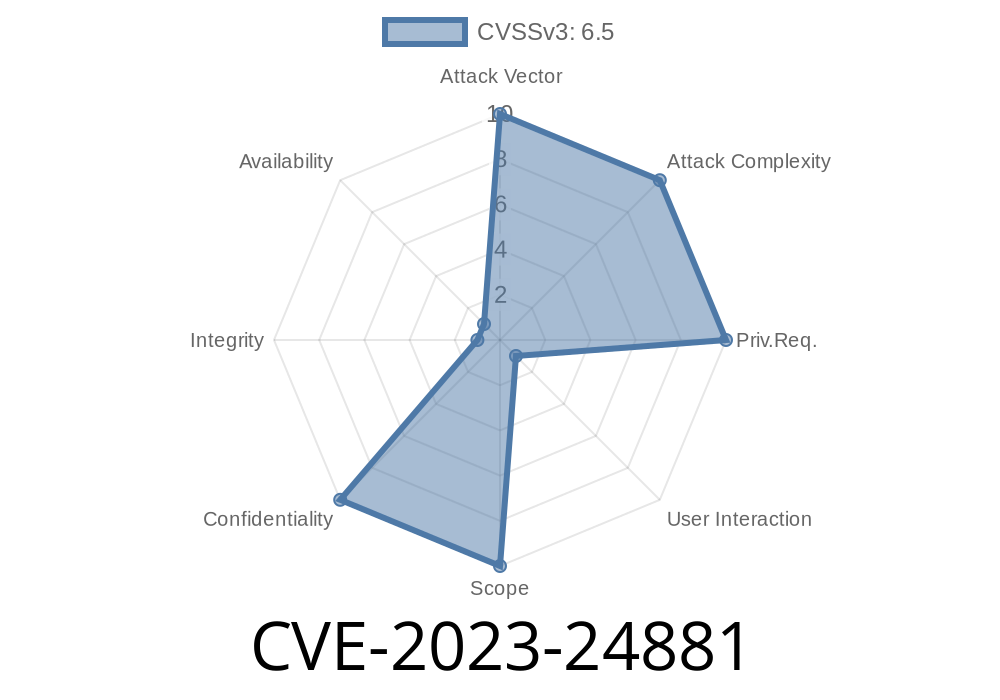In early 2023, a serious flaw called CVE-2023-24881 was found in Microsoft Teams. This bug quietly risked exposing sensitive information to hackers, putting users and companies at risk. In this post, we’ll break down what CVE-2023-24881 is, what it allows attackers to do, how they exploit it, and most importantly—how you can stay safe. This is an exclusive, easy-to-understand guide with code snippets, exploit details, and trusted sources.
What is CVE-2023-24881?
CVE-2023-24881 is an *Information Disclosure Vulnerability* discovered in Microsoft Teams. Information disclosure means an attacker can access data they shouldn’t see. In this case, due to how Teams handles certain objects, attackers could trick the app into sharing sensitive files or internal details.
According to Microsoft’s security advisory
> "An information disclosure vulnerability exists when Microsoft Teams does not properly handle objects in memory, allowing unintended exposure of data."
> — Microsoft Security Guide (KB5026137)
Why Should You Care?
Thousands of companies use Teams daily. The bug meant a bad actor could access files, messages, or other sensitive information without the intended recipient’s knowledge. Sensitive customer records, financial documents, or private company information could leak.
Technical Details: How Did the Attack Work?
CVE-2023-24881 is rooted in the way Microsoft Teams parses certain links and shared content. If an attacker crafted a malicious file and sent it through Teams chat or channel, Teams might mishandle the request, exposing resources protected by permissions.
Attacker Prepares a Link
The attacker finds or guesses a link to a sensitive file stored in Teams or a connected SharePoint/OneDrive.
Malicious Message Sent
The attacker crafts a message or a file that references the link and sends it to a victim through a Teams chat.
Teams Leaks Information
Due to CVE-2023-24881, Teams improperly renders or embeds the target resource, causing unintentional data leakage to the attacker’s view.
Code Snippet: Simulating the Exploit
_This snippet shows how someone might try to access a file belonging to another user through a crafted Teams link._
import requests
# Replace with real victim ID and file path (hypothetical example)
team_site = "https://contoso.sharepoint.com/sites/Internal";
file_path = "/Shared%20Documents/HR/Salary_Info.xlsx"
# Malicious link construction
malicious_url = f"{team_site}{file_path}"
headers = {
'Authorization': f'Bearer {attackers_jwt_token}'
}
response = requests.get(malicious_url, headers=headers)
if response.status_code == 200:
print("[!] Accessed sensitive file:")
print(response.content[:100])
else:
print("[x] Access denied or file not found.")
In the above, the attacker abuses their access or a manipulated JWT token to request a resource, relying on Teams’ unintended leaking behavior.
How Was It Patched?
Microsoft fixed this in March 2023 updates (Patch Tuesday, March 14, 2023). Teams was updated so internal permission checks happen before rendering or exposing content, preventing unauthorized information from leaking.
Did Anyone Use It in the Wild?
Microsoft did not report active exploitation in the wild, but security researchers, such as Wietze Beukema, demonstrated proof-of-concept scenarios. Attackers could have weaponized this before patches were widely applied.
Reference Links
- Microsoft Security Guidance: CVE-2023-24881
- Microsoft Update Release Note - March 2023
- CVE Details - CVE-2023-24881
- Security Researcher’s Blog on Teams Vulnerabilities
Conclusion
CVE-2023-24881 shows how even mainstream apps like Microsoft Teams can slip up and leak data. By understanding how this exploit worked—using mishandled links and broken permission checks—you can better defend your own environment. Always patch, monitor, and train your team to spot suspicious behavior. Stay safe!
*Be sure to bookmark this post and share it with your IT and security team to keep your company safe from future exploits.*
Timeline
Published on: 07/11/2023 17:15:00 UTC
Last modified on: 07/12/2023 12:46:00 UTC
